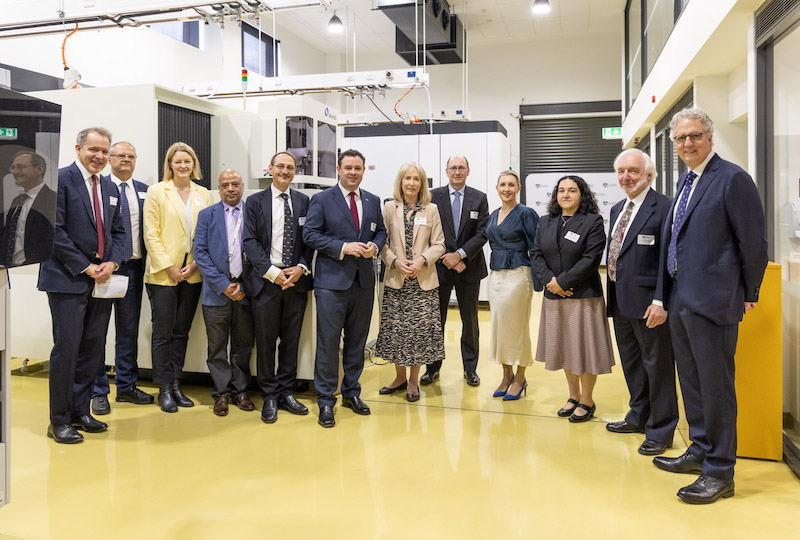Hub puts Sydney at the heart of ‘Industry 5.0.’
A $25 million facility launched today to fuel innovation and boost industrial output in the heart of Sydney’s Tech Central. The facility is a real hub for additional facilities supporting the NSW Government’s projects at Western Sydney Aerotropolis and Western Sydney Parks.

Located in the Engineering district of the University of Sydney’s Darlington campus, the Sydney Manufacturing Hub is a new manufacturing-focused research facility that will work with the industry to deliver advanced R&D in additive manufacturing and materials processing.
It is intended to enable demonstration capabilities from concept to production, including advanced material pre-and post-processing, for educators, students, small and medium-sized businesses, and, if necessary, larger companies to experience and leverage metal 3D printing (also known as additive manufacturing) and advanced manufacturing – often for the first time.
The Hub will provide capabilities for design, topological optimization, the 3D printing of metals, ceramics, and polymers, as well as post-processing heat treatment, advanced characterization, and more paving the way for new technology in industries such as aerospace, autonomous vehicles, biomedical, defense -, maritime and robotics.
Professor Mark Scott AO, Vice Chancellor of the University of Sydney, said the university continues to demonstrate its capabilities as an R&D leader in the region by working closely with the public and private sectors.
“Located in Darlington in the heart of Tech Central, the Sydney Manufacturing Hub is an important demonstration of what is ultimately possible when government, industry, and higher education work together on high-impact technologies.”
“This is evidenced by establishing this new research facility and our collaborative projects in Greater Sydney, particularly the Western Sydney Parklands and Aerotropolis.”
Speaking at the launch, the Minister for Employment, Investment, Tourism, and Western Sydney and the Minister for Trade and Industry, the Hon. Stuart Ayres said: “The concept of modern and additive manufacturing, rather than deductive manufacturing, is completely changing the opportunities available to Australians.”
Director of the University of Sydney’s core research facilities, Professor Simon Ringer, said the Sydney Manufacturing Hub would fuel the state’s ‘Industry 5.0’ revolution.
“Advanced manufacturing makes the previously impossible possible. Key industries will benefit from these technologies through the reduction of material waste, simplified supply chains, and an independent capacity to make materials, components, and even entire machines – all of which were impossible with traditional manufacturing,” said Professor Ringer.
“Using these technologies, we could soon see Australian-designed and built space rocket engines, hypersonic vehicles, satellites, eco-active buildings and structures, and rapidly following the electrification revolution in propulsion. It will even be transformative for areas such as health – our team has recently used additive manufacturing to produce custom orthopedic implants to help with patient-specific needs.”
“We are witnessing a dramatic disruption in the way materials are made that are driving breakthroughs in research. On the one hand, we’re looking at the periodic table with fresh eyes – additive manufacturing allows us to combine elements to create new materials with entirely new combinations of properties at scale. On the other hand, additive and advanced manufacturing have made manufacturing more accessible, with digital workflows making it easier for local businesses to enter competitive global markets.”
The research facility places Sydney at the center of new skills-based development and sets the gears for the state’s advanced “Industry 5.0” output.
The facility will provide specialized consulting, fabrication activation, and training to its industrial partners, providing supervised and autonomous access to the facilities for testing, research, and fabrication.
One such partner is the global leader and pioneer of additive manufacturing technology, General Electric subsidiary GE Additive, which signed a strategic five-year deal with the university in 2020 to increase Australia’s manufacturing capacity.
The University of Sydney and GE Additive are collaborating on materials R&D topics, with experimental work being conducted in the new facility.
Using GE Additive’s state-of-the-art metal printing technologies, the Hub will serve as a technology demonstration center for GE Additive across Australia and New Zealand. It will host industry workshops, training, and collaborative sessions.
GE Australia Country Leader Sam Maresh said small to medium-sized enterprises account for most of Australia’s advanced manufacturing operators and are a priority for Hub collaboration.
“The Sydney Manufacturing Hub is now open to businesses and ready to engage with industry across NSW, particularly SMEs, where there are significant opportunities for new highly skilled jobs. This facility will support industry and researchers’ collaboration and become a commercialization hub for new products and innovations in various advanced manufacturing industries.NSW positions itself at the center of additive manufacturing capability and research in the Asia-Pacific region. The Sydney Manufacturing Hub is an important step towards achieving that ambition,” said Mr. M.aresh.
“We are delighted to be working with the university on this project and see the value of the new facility as an industrial incubator, supporting rapid progress in manufacturing and developing industry-leading skills for Australian SMEs.”
Matthew Giannelis
Secondary editor and executive officer at Tech Business News. Matthew is passionate about sharing his knowledge of the technology industry. He is also an advocate for global cybersecurity issues. He has been working as an IT support engineer for 20 years. He has been working as an IT support engineer for 20 years.

